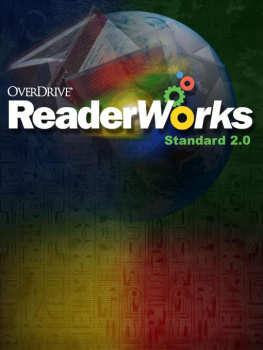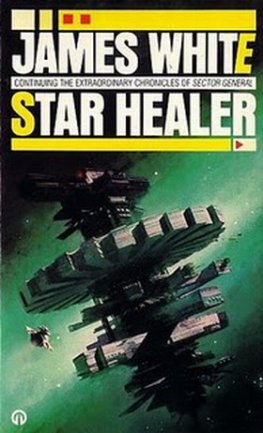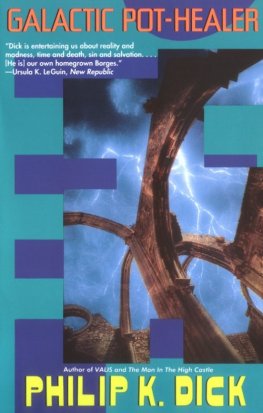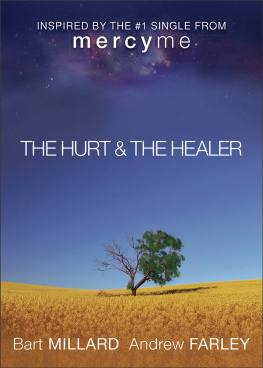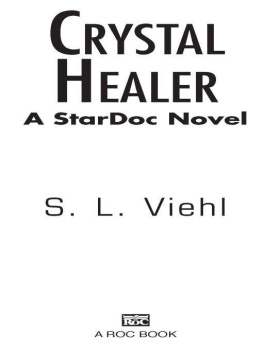Healer - Star Healer
Here you can read online Healer - Star Healer full text of the book (entire story) in english for free. Download pdf and epub, get meaning, cover and reviews about this ebook. year: 2010, genre: Detective and thriller. Description of the work, (preface) as well as reviews are available. Best literature library LitArk.com created for fans of good reading and offers a wide selection of genres:
Romance novel
Science fiction
Adventure
Detective
Science
History
Home and family
Prose
Art
Politics
Computer
Non-fiction
Religion
Business
Children
Humor
Choose a favorite category and find really read worthwhile books. Enjoy immersion in the world of imagination, feel the emotions of the characters or learn something new for yourself, make an fascinating discovery.
- Book:Star Healer
- Author:
- Genre:
- Year:2010
- Rating:3 / 5
- Favourites:Add to favourites
- Your mark:
- 60
- 1
- 2
- 3
- 4
- 5
Star Healer: summary, description and annotation
We offer to read an annotation, description, summary or preface (depends on what the author of the book "Star Healer" wrote himself). If you haven't found the necessary information about the book — write in the comments, we will try to find it.
Star Healer — read online for free the complete book (whole text) full work
Below is the text of the book, divided by pages. System saving the place of the last page read, allows you to conveniently read the book "Star Healer" online for free, without having to search again every time where you left off. Put a bookmark, and you can go to the page where you finished reading at any time.
Font size:
Interval:
Bookmark:
Star Healer
James White
CHAPTER 1
Something struck Conway as odd about the latest bunch of trainees as he stood aside to allow them to precede him into the observation gallery of the Hudlar Childrens Ward. It was not that among the fourteen of them they comprised five widely different life-forms or that their treatment of himhe was, after all, a Senior Physician attached to the galaxys largest multienvironment hospitalwas condescending to the point of rudeness.
To be accepted for advanced training at Sector Twelve General Hospital a candidatein addition to possessing a high degree of medical and surgical abilityhad to be able to adapt to and accept people and circumstances which, back in their home-planet hospitals, they could barely have imagined. At home an off-planet patient would be a rarity indeed, while at Sector General they would be treating nothing else. Furthermore, many of them would find it difficult to make the transition from highly respected member of the local medical fraternity to mere trainee at Sector General, but they would soon settle in.
His mind was playing tricks on him, Conway decidedprobably because he had so much on it at the present time. A rumor was going around about changes in his ambulance ship setup, and he was scheduled for an hour early that afternoon with the Chief Psychologist, always an unsettling prospect.
Conway was also irritated because he seemed to be coming in for more than his fair share of short-term projects and medical odd jobssuch as giving the trainees their initial orientation tour. His special ambulance-ship team had had very few calls in recent months.
"The patients in the ward below are infant Hudlars," Conway explained when the trainees had formed an untidy crescent around and behind him. "They belong to an immensely strong species and, as adults, are extremely resistant to physical injury and disease. So much so that the concept of curative medical treatment has been foreign to them. No medical profession exists on Hudlar, and the high infant mortality rate of the recent past was simply accepted. Their young fall prey to a large number of indigenous pathogens from the moment they are born, and those which do not quickly develop or inherit resistance to them perish. The hospital is trying to develop a wide-spectrum immunization procedure to be carried out during the prenatal stage, but so far with limited success."
He indicated a young Hudlar standing just below them, looking up. "You will already have deduced from this individuals general stance and musculature that the species evolved on a world with very heavy gravity and proportionately high atmospheric pressure, both of which have been reproduced in the ward. You will also observe no beds or rest furniture; patients who can move simply roam about at will. This is because their body tegument is so tough that padded rest areas are unnecessary. Because of the difficulty other species have in telling Hudlars apart, patient ID and case history are impressed magnetically on the metal band attached to the left forelimb. The Hudlars six limbs can serve as either manipulatory or locomotor appendages.
"While gravity and atmospheric pressure have been duplicated here," Conway went on, "the exact constituents of their atmosphere have not been reproduced. Their home worlds air is a thick, semiliquid soup laden with tiny, airborne food particles which are absorbed and excreted by specialized areas of the skin. We find it more convenient to spray them periodically with a nutrient paint, as two of the armored medical attendants are doing now.
"With the facts now in your possession," he said, turning to regard them, "would anyone like to classify this life-form?"
For a moment there was no verbal response. The Orligian DBDGs moved restively, but the expressions on their humanoid features were concealed by facial hair. The silvery fur of the caterpillarlike Kelgian DBLFs was in constant motion, but the emotions which the movements expressed were readable only by a fellow member of the species or by a being carrying a Kelgian tape in its mind. As for the elephantine Tralthan FGLIs and the diminutive Dewatti EGCLs, their features were too decentralized to be visible in their entirety, while the hard, angular mandibles and deeply recessed eyes of the Melfan ELNTs were completely expressionless.
One of the four Melfan trainees first broke the silence, Its translator hummed briefly, "They belong to physiological classification
PRO B."
It was difficult to tell Melfans apart at the best of times, since all adult ELNTs possessed similar body mass and the only visible differences were the subtle variations in marking on the upper carapace. To make identification even more difficult, two of the four Melfan trainees seemed to be identical twins. One of these had spoken.
"Correct," Conway said approvingly. "Your name, Doctor?"
"Danalta, Senior Physician."
Polite, too, Conway thought. "Very well, Danalta. But you were slow in making the identification even though your colleagues were even slower. All of you must learn to quickly and accurately classify"
"With respect, Senior Physician," the Melfan broke in, "I did not wish to offer gratuitous display of my medical knowledge, woefully limited as it is at present, until my colleagues had a chance to respond. I have studied all that was available to me regarding your physiological classification system. But I come from a backward world where the level of technology is low and intercultural communication has been limited, particularly where medical data on this hospital was concerned.
"Besides," it concluded, "the Hudlar life-form is distinctive, unique, and could only be FROB."
Conway would not have described Melf as a backward world and neither would any other member of the Galactic Federation, so this Danalta must have come from one of the colonies recently seeded by Melf. To qualify for Sector General with a background like that required determination as well as professional competence. It did not matter that the Melfan was turning out to be an odd combination of polite, self-effacing smart aleckthe operative word was "smart," and the best assistants an overworked Senior could have were those who strived to render their superiors redundant. He decided that he would keep a close watch on Danaltas progress, for purely selfish reasons.
"Since it is possible," Conway said dryly, "that a number of your colleagues are less well-informed on this subject than you, I shall outline very briefly the system of life-form identification which we use here. Your various specialist tutors will take you through it in more detail."
He looked for Danalta, but the trainees had changed their positions and Conway could no longer tell which of the two identical Melfans was which. He went on, "Unless you have already been attached to a multienvironment hospital, you will normally have encountered off-world patients one species at a time, probably on a short-term basis as the result of a ship accident or some emergency, and you would refer to them by their planets of origin. But herewhere rapid and accurate identification of incoming patients is vital because all too often they are in no condition to furnish physiological data themselveswe have evolved a four-letter physiological classification system. It works like this.
"The first letter denotes the level of physical evolution reached by the species when it acquired intelligence," he continued. "The second indicates the type and distribution of limbs, sense organs, and body orifices, and the remaining two letters refer to the combination of metabolism and food and air requirements associated with the home planets gravity and atmospheric pressure, which in turn gives an indication of the physical mass and protective tegument possessed by the being."
Next pageFont size:
Interval:
Bookmark:
Similar books «Star Healer»
Look at similar books to Star Healer. We have selected literature similar in name and meaning in the hope of providing readers with more options to find new, interesting, not yet read works.
Discussion, reviews of the book Star Healer and just readers' own opinions. Leave your comments, write what you think about the work, its meaning or the main characters. Specify what exactly you liked and what you didn't like, and why you think so.

